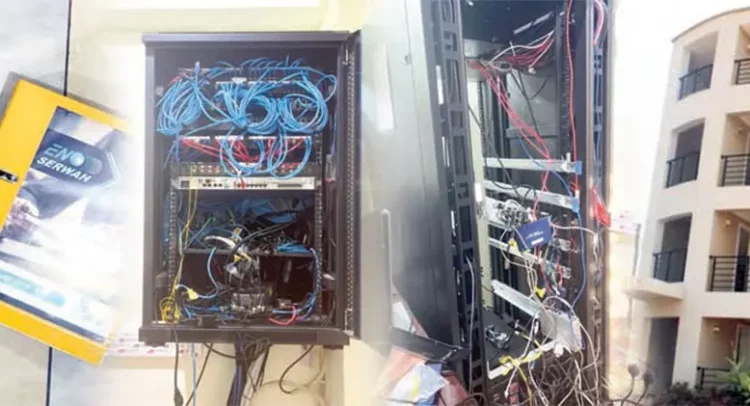The destroyed real-time revenue monitoring systems at the SML offices
The offices of the Strategic Mobilisation Ghana Limited (SML) at Osu and Tema were yesterday morning, turned upside down by operatives from the Office of the Special Prosecutor (OSP) and National Security.
During the raids, the operatives dismantled the real-time monitoring system including monitors, servers, computers and other critical tech components.
“They literally destroyed the entire monitoring system which will significantly impact the operations of Customs Division of the Ghana Revenue Authority with millions expected to be lost daily. If you are not monitoring, the cartels will be having a field day. I was told a call came from Customs to not touch the main monitoring system, but they still went ahead to destroy everything. This system is for Customs,” a source on the grounds mentioned.
The raids, ostensibly conducted over SML’s contract with the Ghana Revenue Authority (GRA), come amid mounting allegations that powerful petroleum industry players and oil cartels are driving a sustained campaign to dismantle oversight systems that have cost them billions in previously unreported revenue.
Other sources also suggest the timing of the raid is no coincidence, following months of intensified pressure on SML despite institutional backing from both government auditors and parliamentary committees. “This appears to be the culmination of a coordinated effort by vested interests including oil cartels who have been threatened by the transparency SML’s systems have brought to the sector,” one industry insider, speaking on condition of anonymity, said.
The OSP has been in active engagement with SML since March 2025. Correspondence between SML and the OSP shows that SML has been cooperating with the Special Prosecutor and has provided information based on requests from the OSP. Analysts therefore are surprised that this raid has taken place, and are suspicious of the power of vested interest from the cartels and other industry actors.
SML’s revenue assurance platform has fundamentally transformed reporting in Ghana’s downstream petroleum sector. Before the company’s engagement, monthly reported fuel volumes averaged just 208 million litres—far below actual market activity.
Today, accurate reporting has increased this figure to 450 million litres per month. Between May 2020 and December 2024, SML’s systems captured 14.1 billion litres of previously unreported fuel, generating over GH¢20 billion in additional tax revenue for the state.
This dramatic improvement in revenue collection has coincided with sustained opposition to the company’s operations.
The scale of previous revenue leakages was enormous. In 2019 alone, 2.36 billion litres of petroleum products went untaxed, resulting in estimated losses of GH¢3.4 billion, or approximately GH¢283 million monthly.
Since 2020 and at the height of COVID-19 pandemic, the Ghana Revenue Authority has consistently achieved its revenue targets from the petroleum sector due mainly from the revenue assurance system deployed by SML.
Despite a comprehensive 306-page KPMG audit commissioned by President Nana Akufo-Addo in 2024 finding no evidence of financial misconduct, and public endorsements from both the GRA and Parliament’s Energy Committee, opposition to SML has intensified rather than subsided.
The Energy Committee in the previous parliament, chaired by Atta Akyea, specifically noted that SML’s systems had disrupted a “well-entrenched network” of illicit actors and cartels in the petroleum sector. The GRA has similarly credited SML’s systems with significantly improving revenue assurance.
However, sources familiar with the petroleum industry suggest these institutional endorsements have only strengthened resolve among the oil cartels and those seeking to undermine the revenue monitoring system. “When you are dealing with billions in previously unmonitored revenue streams, the incentives to roll back oversight are enormous,” another source close to the sector dynamics explained.
The campaign against SML has been led prominently by investigative journalist Manasseh Azure and various civil society groups, focusing on procurement irregularities and contractual disputes. SML has responded with a GH¢21 million defamation lawsuit, maintaining that attacks on its credibility serve interests that profited from previous tax leakages.
Industry analysts suggest yesterday’s raid represents a critical juncture for Ghana’s revenue assurance efforts. The outcome could determine whether systems that have recovered over GH¢20 billion in additional tax revenue will be allowed to continue or dismantled under pressure from actors threatened by accountability measures.
A Daily Guide Report


